

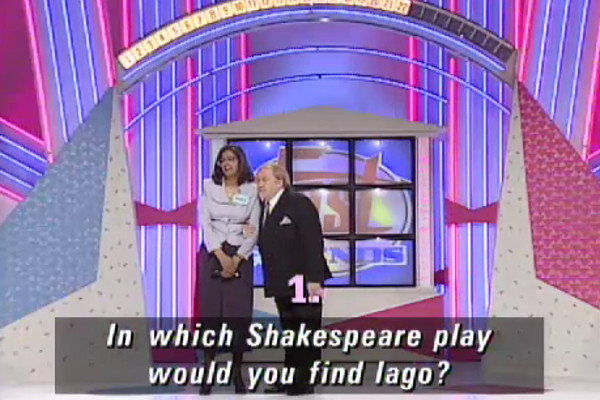
One really shocking thing about Fast Friends is the aptly rapid pace of recording. The recording dates of the pilots are unknown, but for the broadcast episodes, this edition was the sixth to be recorded in just four days. The "two per week" schedule of Blankety Blank was not for this show, and while Les was still recording just two in one night, this was done three days a week. From the 21st-28th March ten episodes were in the can. This left just a short break for two more on the 4th April, the only two to be shot after the show had begun airing.
So, what of some of the unheralded, behind-the-scenes personnel? As well as the names listed onscreen, then Toby Freeman and Celia Pincus also provided question material but weren't credited. Then there were Paul Minett and Brian Leveson, writing partners who went on to write episodes of things like My Family (2000-2011) and created the sitcom Time After Time (1994-1995). At this stage they'd written for a 1987 edition of The Les Dawson Show, and provide script material for Les, again uncredited, in all fourteen broadcast episodes.
There's also the warm ups. Ted Robbins, credited as "contestant liason", was the warm-up man for the first 7 episodes (in broadcast order), including this one. Then there were also three episodes with Bobby Bragg as warm-up, and two apiece for Ian Irving and Jeff Stevenson.
As Les is the only "name" in front of the camera, I asked the warm up guys for their recollections, save for Bobby Bragg who sadly passed away in 2016. Ian Irving suggested that there was a hectic schedule involved, telling me on Twitter (no one calls it X) that: "It was full on but great fun, I am looking forward to doing some more warmup gigs again in the future."
Jeff Stevenson - who had also kindly shared memories for the article on Blankety Blank Series Thirteen - gave more details, noting: "It was a nightmare! [...] I seem to remember the show required two warm ups and it was Ted Robbins warming up the contestants and I warmed up the audience. I think we filmed it at Elstree."
The show was, indeed, filmed at Elstree, though Jeff was concerned that his memories of a 33-year-old TV show might not be accurate, and to check with Ted Robbins. Ted confirmed that the set up matched with his memories with a "Bang on Jeff !!", while Stevenson also revealed that, "I was called in last minute as there were so many problems."
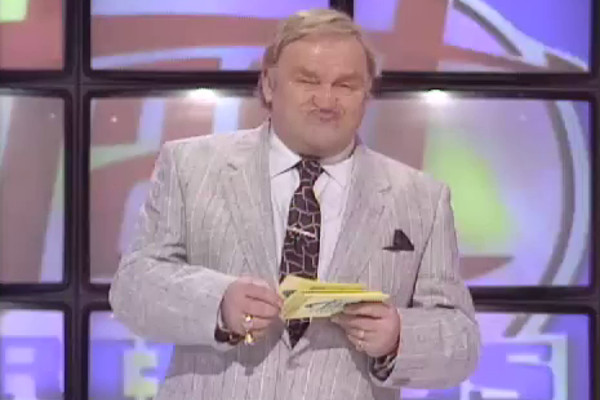
One thing about quizzes of the era is that, while not exactly intellectual pursuits, they did have questions harder than you'd expect in hindsight. Watch an episode of Bullseye, for example, and you might find a question on Greek mythology or 19th century post-impressionist painters from France. Some distance removed from 2024 and Alan Carr asking you to name a person on a photograph. Yes, there are more difficult quizzes today, but this is what passed for light entertainment at the time.
As said earlier, Fast Friends isn't exactly University Challenge, but it still has questions that you may not know the answer to. Obviously such things are entirely subjective, and you either know the answer or not, but there are levels of questions that you would expect more people to know than others. For example, someone asking what animal goes "moo" is likely to get more response than being asked about quantum mechanics. Questions about Shakespeare, geography and ancient culture can abound, and in order to test the show I played along at home with this edition.
The second round is contested until one team has all their players eliminated by incorrect answers, or, if the duration runs out, they go to a "tiebreaker". But due to the nature of this part of the game, the number of questions asked can vary, though is usually around 15-17 questions.
This one had 17 questions for the main game, plus the opening eight questions to find the "Fast Friends" (four for each team) making a total of 25. Out of this, I got 56% right, but 36% of them were guesses, while I got 11 wrong. Even factoring in my own stupidity, that's a pretty solidly challenging quiz. Not "tough", exactly, but questions about Mark Twain, Oliver Cromwell and grouse shooting aren't the sort of things you'd get on an episode of Lingo.
Despite the very public slating the series took, it's not quite the moronic gameshow that it's made out to be... or maybe time has just dumbed down so much in the intervening 33 years making it appear that way.
Lastly, some of Les's most appreciated jokes come off the back of the questions themselves. While the odd one does seem like a genuine ad-lib, occasionally a question card will have a white strip across it, presumably containing the pre-written gag. This one has Les getting laughs with a ruder joke than normal for the show, commenting on how the description of bed as being a "poor man's opera" is accurate: "three short movements, a lot of screaming and it's over".
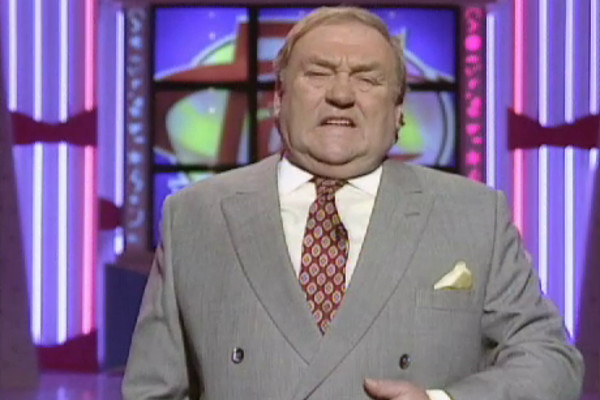
After three weeks on air, the reviews really started to come in, and they weren't favourable. James Green slated the show in The Stage after this one had aired, and presciently noted the effect of the changing times on Les's career: "Who'd be a comedian in 1991? No ethnic jokes. Nothing sexist. A threat to ban mother-in-law gags which have been his speciality along the lines of 'in the season she swims up and down Loch Ness'. And material being used at a rate of knots".
The Times initially laid the blame on the format, with "Forgettable quiz show hosted by the splendid Les Dawson, who could do with a better outlet for his talent", but later seemed to pass the blame on to Les himself with "Les is on hand with the dreadful jokes". Local newspapers had it as "Les Dawson does his very best but rarely has a more deeply moronic game show besmirched our Saturday night screens".
Les was not oblivious to the bad reaction to the show, writing in No Tears For The Clown
that: "The reviews were all ghastly, the ratings were so low the only people who watched it lived in a submarine, and frankly Fast Friends put a man-sized nail in my theatrical coffin."
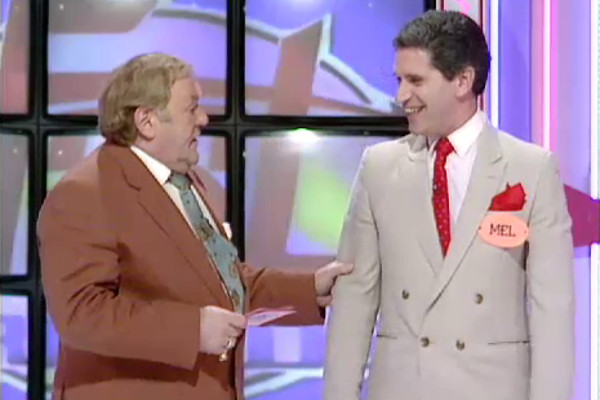
At this point it should be clear that this is more of a general overview of Fast Friends, rather than episode-specific. While the top few episodes are genuinely a bit better than the others, this is a very "samey" show, so there's not really anything to separate most of them. Everyone involved is a member of the public, so there's not really much difference, no Roy Kinnear turning up in a mock-bad mood, or Frank Carson trying to steal the show.
This edition is slightly different in that one of the Team Captains, Mel Romane, is a bit of a minor celebrity. Not huge, or even "Blankety Blank panellist" level, but he's a cabaret performer on cruise ships who was on telly for a couple of things. One was a local news presentation, the other was an episode of Home Away From Home, a Gloria Hunniford-fronted reality show where couples swapped houses and rated the experience.
It's not exactly a "name", but Mel has earned a living in showbiz. While the articles on Blankety Blank were able to express fascination with the various celebrity egos and vanity, there's no such chance here, and Mel seems like a nice guy. A few other contestants in other episodes state that they're stand up comedians, but research shows their efforts to be largely unsuccessful, or not recorded.
Lastly, it was mentioned earlier about the number of questions varying in the second round. This edition has a particularly low number of questions as (spoiler) Mel's team lose incredibly quickly, though it would take a nerd of colossal proportions to do something as sad as sit and count the number of questions in every episode of Fast Friends.
... okay, so not including the two pilots or the incomplete copy of Episode 2, the remaining 13 episodes averaged at 20 questions in the middle round. (Or 20.31 if you want to be really exact.) This edition had by far the smallest number of questions, with just nine being asked before the game was over. The next lowest amount was 14 in Episode 5, while the highest number of questions in the middle round was 27 in Episode 6.
I did also take this nerdism to a higher plane by playing the game on each - this edition was one of five where I got more questions wrong than right, and overall I just got 53.4% of the multi-choice questions right. (Should you care, include the straight questions of the first round where there's no options given, and I just scraped 51%.)
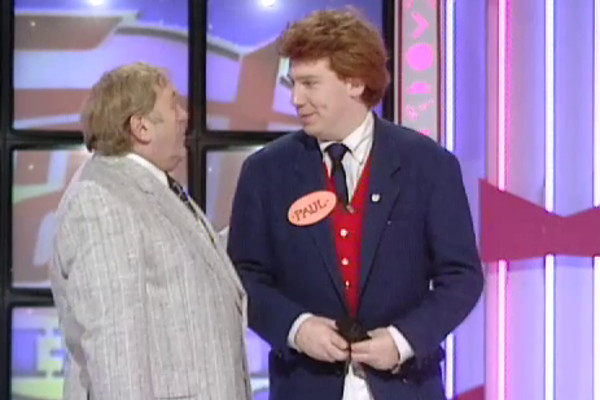
One pretty successful vein of humour in the show is Les insulting the appearance of all the contestants. As there's not much outlet for his gags, and the people involved aren't famous, he can only initially go by what they look like. This edition has a Team Captain told: "It's amazing what those Oxfam shops can do", causing her to giggle. Yet such gags perhaps work better - for the viewer, if not for those involved - if they aren't taken very well. The other Team Captain, sporting bright red, is told, "Love that waistcoat, thought you'd had a haemorrhage", causing him to button up his jacket and say "very good" with pursed lips.
Another recurring gag throughout the series is Les alluding to Ken Dodd being acquitted of tax evasion. As the trial concluded in July 1989, it wasn't strictly "topical", but it was up-to-date by Les's standards. Ironically, this edition features a question about Ken and Les doesn't make a joke out of it.
One thing to note is that Les frequently gets the rules mixed up on this edition, or forgets his place in the running of things, often asking the contestants what he should be doing. It's actually a good sign, as he's in pretty good form, and with his mind not unduly distracted by the rigid rules of the game, he's able to generate a few more laughs than in other episodes.
Those Ken Dodd gags in full, then:
The Second Pilot/Episode 7, after a question about Al Capone being jailed for tax evasion: "He could have got out of it, he could have changed his name to Ken Dodd", Followed by an impression.
Episode 8, Les claims there were two new members of the Diddy Men: Diddy Pay and Diddy 'Ell.
Episode 12, a question about Ken living in Knotty Ash: "I didn't believe that, I thought he said he lived in poverty."
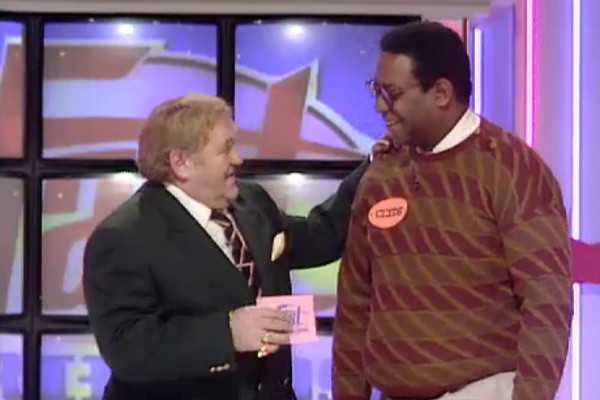
This edition makes the top three just because of the warmth involved. It can be uncomfortable watching contestants reacting to Les like he's a boring uncle at a wedding, so it's far more pleasant here, particularly with, as pictured, the adorable Clyde James. Clyde gets a bit of Les's racial patronage ("Baby!" "My man!") but there's no harm meant by it, and it's 33 years ago. Les also gets a good response from the audience, particularly when he alludes to the show being full of mistakes that were edited out: "... and believe me, when a show goes smooth, it's such a joy."
Where would Les's career have gone after this? Certainly Fast Friends did derail it, and it's curious to know where the future would have taken him. Most of the shows that had him on after this were the "middle of the road" that was perhaps phasing out, like appearances on a celebrity Christmas Telly Addicts, or co-hosting an edition of Terry Wogan's post-Wogan, post-watershed chat show Friday Night.
There were also appearances in 1992 on two editions of This Is Your Life (for Mo Moreland and for his own, second, "Life") as well as an episode of Aspel & Company that aired less than three weeks before his death. One horrible irony is Les joking in Episode 4 of Fast Friends that Surprise! Surprise! was like the work of Burke and Hare, "digging up old bodies for money"... one of Les's last TV appearances was a posthumous one on the show, broadcast 24 days after his death in June 1993.
There are signs that he'd have moved into acting, as he appeared in the decent 1993 comedy drama Demob in a guest role, though he sadly died during production. There was also 1991's adaptation of an Argentinian drama, Nona, where he played a 100-year-old grandmother. It's difficult to say. Les certainly wasn't experienced as an actor outside of comic roles (Nona: "We rehearsed in London for three weeks and I learnt a lot from the marvellous cast") and it was a very new area for him.
Perhaps the most unsettling post-Fast Friends appearance by Les was on a particularly lifeless edition of Aspel & Company, where he told some jokes that were over two decades old, then went into unusually "blue" material with a story about his sperm test. What makes it eerie is a horrible moment where Les jokingly checks if he has a pulse... 18 days later he would be dead of a heart attack. Seeing him joke with Michael Aspel about how great he feels, when he unknowingly had less than three weeks left on this Earth is a retrospectively chilling sight.
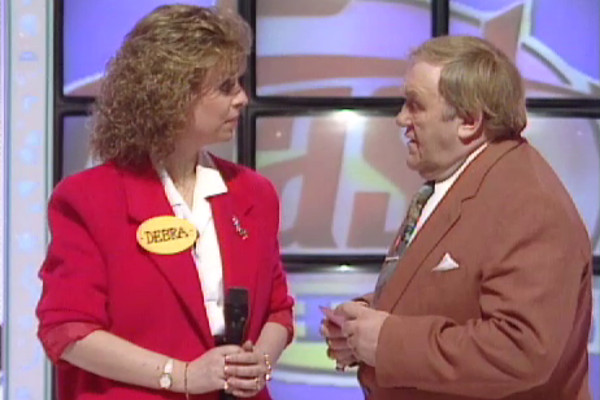
Les stated in his autobiography that there were two unscreened pilots, with the first a complete disaster: "I don't think the first programme will ever be forgotten by those who suffered through it, but they say that time is a great healer. For a start, the company who had sold the game show to the Beeb had brought in what can almost be described as 'professional contestants'. They knew more about game shows than we did. They very nearly took over the show, and the studio audience sat with their mouths agape watching the battle royal taking place before them ... it was one hell of a punch- up. At one stage the contestants surrounded the Head of Variety and the poor devil had virtually to be rescued by armed police!"
This would seem to partially tie in with this edition, which has some of what appear to be "professional contestants" (of which more in a minute), but Les opens with "Here we are again, how quickly the weeks fly by", suggesting it's the second. The second was written up as: "I got rid of some of the 'professional contestants' and brought several of the studio audience in as replacements and we did the show again. It was about as enjoyable as watching the slaughter of a bullock; to make matters worse, the replacements were heckled by the original contestants, at least one of whom was blotto."
One point that should be noted here is that the audiences from opposing teams heckling each other occurs in each edition and appears to be encouraged as part of the show. While Les's second autobiography would have recall, being published just the year after Fast Friends ended, he does show more of a tendency to "go for the gag" in it, as can be witnessed by some of his comic exaggerations here.
Some of the elements from this edition were also recycled for later use, namely:
* A decent opening gag about Walter Raleigh is retold, word-for-word, as the start of Episode 4;
* Episode 12 reuses two questions used to choose team members: "Which sport is governed by the A.S.A.?" and "Who was the Labour Party Leader before Neil Kinnock?"
However, by far the most significant "reuse" is the contestants themselves. Yes, watch Episode 14 of the show and Les will talk to team leaders Huw David and Debra Lewis, acting like he's never met them before... despite the fact that they appear in this unbroadcast episode. Lewis, in fact, kind of gives the game away a little, giving an almost sarcastic "...Lewis" when Les asks for her last name, causing Les to give a forced "Yes" and moving on to asking her what she does for a living. (Which is, not unsurprisingly, the same job she does here.) These moments are very "micro", and you'd probably never pick up on them without the knowledge of this edition.
The reason why this one ranks so highly is not only the curiosity factor of seeing something that never made it to air, but also Les struggling with the verbal encouragement to contestants under the timer selection process. While he describes would-be players as "fat heads" throughout most of the series, this one also sees him go into open abuse, including: "No, is it bloody... what yer talkin' about?" to a woman who gets a question wrong. There's jokes that Les stumbles over (including giving us a "mother" instead of mother-in-law gag) and his habit of sweating is very much in evidence.
For the rules, then the "lifeline" option hasn't been included at this stage, and Les alternates between calling the eliminated players area "dump dock" (as with the rest of the series) and "flop dock", further evidence that this pre-dated everything else in the list outside of the US pilot. One final piece of trivia: there are 18 questions in the middle round in this one, with the option of "neither" appearing quite consistently. I got 50% right.
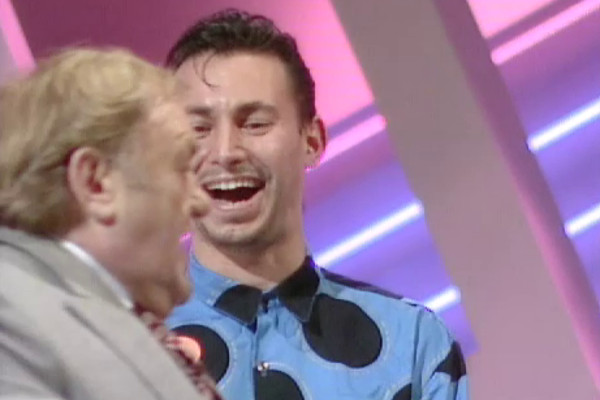
The contestant laughing in the screenshot is one Paul Wilder, a bespectacled TV extra who has appeared in hundreds of shows doing background work, including series like The Bill and EastEnders. At the time of recording he had been banned by several production companies for appearing on too many quiz shows, including Action Time, the producers of Fast Friends.
Paul wrote a book with his friend Paul Burton in 2009, titled Paul Wilder: My Quest for TV Fame, which you can buy from Amazon by clicking on the highlighted text. (Yes, all the red text bits are links if you didn't know.) In the book Paul quotes from a letter he received from Action Time, which included the information: "I am afraid you are a victim of your own success. You certainly have been 'blacklisted' by Action Time because we are always looking for new and exciting contestants to give them a chance of appearing on TV." Paul managed to get through the audition selection for Fast Friends by using his brother-in-law's name of "Gary Keyes" to get on the show, and changing his appearance: "[...] in the hope that I wouldn't be recognised at the studios on the day by any of the representatives of Action Time, I gelled back my hair and took my glasses off. In the event it worked [...] It was a fantastic feeling to have beaten the ban."
It's Paul's enthusiasm for the show and appreciation of Les's jokes that go towards making this one rank top. He's not alone, as Les gets good reactions elsewhere, making it the most bouyant and pleasant of the series. Sadly, Fast Friends had performed so badly on Saturday night primetime that from this episode onwards the series was pushed onto Friday nights at 8pm. What replaced it was repeats of Columbo that were over a decade old... and did better in the ratings. Worse still, in its new Friday night home, ITV were showing a Lynda Bellingham-James Bolam sitcom, Second Thoughts, which thrashed it in the ratings.
Just 4.8 million tuned into this episode, and it fell to the 71st place in the charts. This ratings disaster continued, with all seven episodes from the second half of the series averaging at 73rd place in the charts. Of the viewing figures, then the number of viewers for Episode 12 can't be traced, but the other six averaged at just 4.6 million.
It's a shame, because, as the twelfth of sixteen episodes to be shot, Les is started to get settled at this point. The game play can be a little confusing, and there are definite signs that keeping the game going is a distraction to Les when he's trying to crack jokes as well, but here he's on form, generating rare chuckles in the show.
It also helps that he's got an audience to work with for a change, with two young men, including the one pictured, cracking up at his gags and comic insults. No one can seem funny if the person on the receiving end of a gag just gives an indulgent smile, so it's nice to have a break from the lack of reaction. Despite this, Les's crack of "I dunno why I bother, you stand up here, trying desperately to infuse some life into this..." isn't the angry comic ranting of his Blank days, but seems almost a genuine cry for help.
So is Fast Friends something that you should watch? No, not particularly. It's a so-so quiz that's not a great vehicle for Les, and is ultimately forgettable. But it's not that bad, and with a bit more thought could have even been halfway decent. But really, how many quiz shows can you name that are essential viewing?
The idea that it was an "okay" quiz, rather than an awful one, was also something echoed by Les's second wife, and it seems fitting that this overview ends with another quote from the man himself on the subject: "Tracy, supportive as always, said, 'The show was no worse than some of the others they put out,' and to a degree she was right. The trouble was, it was too American for British audiences, and that is all I'm prepared to say without a cheap lawyer around, if there is such a thing."
If you'd like to treat me to a coffee for this journey into Fast Friends, then the button is below, but if you don't, that's fine too. I hope you enjoyed it.